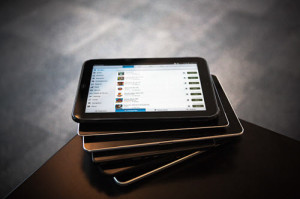
Windows tablets will gain market share in the coming years, but not fast enough to challenge the dominance of Google’s Android and Apple’s iOS, IDC said on Tuesday.
IDC is projecting Windows tablets to occupy 10.2 percent of the market by 2017, growing from a projected market share of 3 percent this year. By comparison, tablets based on Android and iOS will register slight dips.
In 2017 Android will have a tablet share of 58.8 percent, compared to the projected 60.8 percent this year. Apple’s iOS will have a 30.6 percent in 2017, compared to 35 percent this year.
Microsoft’s tablet market share will increase, thanks to more devices and aggressive pricing. But underlying Windows OS, device design and application problems will continue to prevent faster growth, said Tom Mainelli, research director of tablet research at IDC.
Acceptance of Windows 8 wasn’t as strong as Microsoft hoped, and the company confused customers by creating one OS designed for both desktops and tablets, Mainelli said.
“Microsoft still believes people want a tablet with the power of a PC,” Mainelli said, “People don’t want the complexity of a PC in tablets.”
Consumers are also still not sure what to make of the two OS flavours – Windows 8 for x86 processors and Windows RT for ARM processors – Mainelli said. Microsoft in October shipped Windows 8.1 to succeed Windows 8.
“They are forced to sell hardware with one of three Windows OSes, that’s at least one too many,” he said. “Microsoft internally has a better handle on it, now they have to market it better.”
In addition, the application ecosystem for Windows 8 is still weak, Mainelli said. Microsoft is pushing unified application development for tablets and laptops, but that approach is complicated by the different screen sizes on various devices, he said.
“I don’t think that’s the best way to write apps for any of those platforms” since users interact with different devices in different ways, Mainelli said.
“Only one hit tablet is needed for Windows OS to succeed, but there’s been little innovation in device designs,” Mainelli said. There are many device vendors launching similar Windows tablets. Microsoft, Dell, Hewlett-Packard, Toshiba, Acer and others are offering Windows tablets.
“How those vendors differentiate continues to be a challenge,” he said.
Microsoft is trying to parlay its past success in PCs into hybrid devices that have tablet and laptop functionality. The hybrid devices come with a range of features that include detachable screens, and hybrids are also are being referred to as “2-in-1″ devices.
“The idea of 2-in-1 sounds good, but we haven’t seen success in products,” Mainelli said.
However, he expects a big marketing push for Windows tablets that could boost shipments. Microsoft will not give up on the tablet market, Mainelli said.
“Microsoft and its partners would like to see that growth happening more quickly.”



